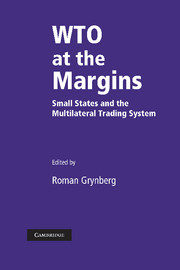Book contents
- Frontmatter
- Contents
- List of figures and appendices
- List of tables
- List of contributors
- Introduction
- Part I Theory and evidence
- Part II WTO and small economies
- Part III WTO dispute settlement
- Part IV Negotiating issues and institutional arrangements
- 17 WTO fisheries subsidies negotiations: implications for ACP fisheries access arrangements and sustainable management
- 18 Plurilateral financial standards and their regulation: the experience of small developing states
- 19 Export processing zones and the WTO Agreement on Subsidies and Countervailing Measures
- 20 The accession of Vanuatu to the WTO: lessons for the multilateral trading system
- Index
18 - Plurilateral financial standards and their regulation: the experience of small developing states
Published online by Cambridge University Press: 05 May 2010
- Frontmatter
- Contents
- List of figures and appendices
- List of tables
- List of contributors
- Introduction
- Part I Theory and evidence
- Part II WTO and small economies
- Part III WTO dispute settlement
- Part IV Negotiating issues and institutional arrangements
- 17 WTO fisheries subsidies negotiations: implications for ACP fisheries access arrangements and sustainable management
- 18 Plurilateral financial standards and their regulation: the experience of small developing states
- 19 Export processing zones and the WTO Agreement on Subsidies and Countervailing Measures
- 20 The accession of Vanuatu to the WTO: lessons for the multilateral trading system
- Index
Summary
Introduction
A recent WTO proposal presented by the small Caribbean island of Antigua and Barbuda on behalf of some small states, aimed at ensuring greater fairness and participation by all in the process of setting genuinely international standards for the regulation of financial services, has brought to the fore an issue that has been silently brewing in the midst of services negotiations at the WTO. The question of how to ensure that the international regulation of financial services becomes an inclusive process for small developing states has in recent years assumed paramount importance in securing their economic growth and viability within the multilateral trading system.
One of the great ironies of the post-Cold War period of globalisation has been that while it has been associated with trade and economic liberalisation, it has also been coupled with the creation of a number of standardsetting bodies which have in turn spawned a multiplication of what are essentially plurilateral standards and regulations. These international standards, to the extent they existed in the past, did not involve small developing states which were outside the global process of integration.
However, many of these small developing states which have now developed not inconsiderable export-oriented offshore financial services sectors are faced with implementing increasingly complex external regulations as part of their integration into the multilateral system and the WTO. While small developing states have almost invariably been excluded from the process of formulation of international financial standards and regulations, they have, by and large, been unwilling objects of international regulatory authorities.
- Type
- Chapter
- Information
- WTO at the MarginsSmall States and the Multilateral Trading System, pp. 633 - 683Publisher: Cambridge University PressPrint publication year: 2006



